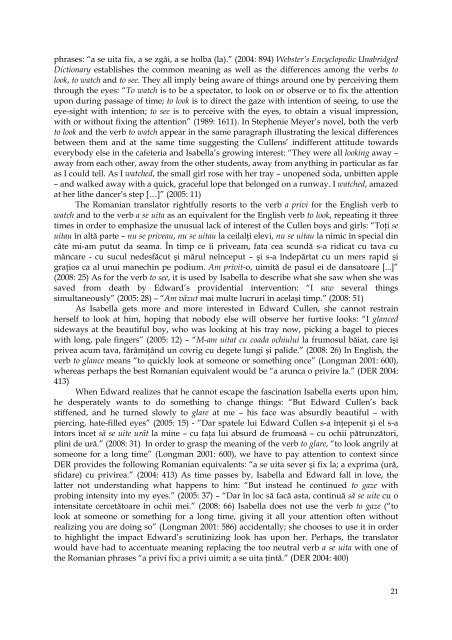Vol. 5/2009 - Facultatea de Litere
Vol. 5/2009 - Facultatea de Litere
Vol. 5/2009 - Facultatea de Litere
You also want an ePaper? Increase the reach of your titles
YUMPU automatically turns print PDFs into web optimized ePapers that Google loves.
phrases: “a se uita fix, a se zgâi, a se holba (la).” (2004: 894) Webster’s Encyclopedic Unabridged<br />
Dictionary establishes the common meaning as well as the differences among the verbs to<br />
look, to watch and to see. They all imply being aware of things around one by perceiving them<br />
through the eyes: “To watch is to be a spectator, to look on or observe or to fix the attention<br />
upon during passage of time; to look is to direct the gaze with intention of seeing, to use the<br />
eye-sight with intention; to see is to perceive with the eyes, to obtain a visual impression,<br />
with or without fixing the attention” (1989: 1611). In Stephenie Meyer’s novel, both the verb<br />
to look and the verb to watch appear in the same paragraph illustrating the lexical differences<br />
between them and at the same time suggesting the Cullens’ indifferent attitu<strong>de</strong> towards<br />
everybody else in the cafeteria and Isabella’s growing interest: “They were all looking away –<br />
away from each other, away from the other stu<strong>de</strong>nts, away from anything in particular as far<br />
as I could tell. As I watched, the small girl rose with her tray – unopened soda, unbitten apple<br />
– and walked away with a quick, graceful lope that belonged on a runway. I watched, amazed<br />
at her lithe dancer’s step […]” (2005: 11)<br />
The Romanian translator rightfully resorts to the verb a privi for the English verb to<br />
watch and to the verb a se uita as an equivalent for the English verb to look, repeating it three<br />
times in or<strong>de</strong>r to emphasize the unusual lack of interest of the Cullen boys and girls: “Toţi se<br />
uitau în altă parte – nu se priveau, nu se uitau la ceilalţi elevi, nu se uitau la nimic în special din<br />
câte mi-am putut da seama. În timp ce îi priveam, fata cea scundă s-a ridicat cu tava cu<br />
mâncare - cu sucul ne<strong>de</strong>sfăcut şi mărul neînceput – şi s-a în<strong>de</strong>părtat cu un mers rapid şi<br />
graţios ca al unui manechin pe podium. Am privit-o, uimită <strong>de</strong> pasul ei <strong>de</strong> dansatoare [...]”<br />
(2008: 25) As for the verb to see, it is used by Isabella to <strong>de</strong>scribe what she saw when she was<br />
saved from <strong>de</strong>ath by Edward’s provi<strong>de</strong>ntial intervention: “I saw several things<br />
simultaneously” (2005: 28) – “Am văzut mai multe lucruri în acelaşi timp.” (2008: 51)<br />
As Isabella gets more and more interested in Edward Cullen, she cannot restrain<br />
herself to look at him, hoping that nobody else will observe her furtive looks: “I glanced<br />
si<strong>de</strong>ways at the beautiful boy, who was looking at his tray now, picking a bagel to pieces<br />
with long, pale fingers” (2005: 12) – “M-am uitat cu coada ochiului la frumosul băiat, care îşi<br />
privea acum tava, fărâmiţând un covrig cu <strong>de</strong>gete lungi şi pali<strong>de</strong>.” (2008: 26) In English, the<br />
verb to glance means “to quickly look at someone or something once” (Longman 2001: 600),<br />
whereas perhaps the best Romanian equivalent would be “a arunca o privire la.” (DER 2004:<br />
413)<br />
When Edward realizes that he cannot escape the fascination Isabella exerts upon him,<br />
he <strong>de</strong>sperately wants to do something to change things: “But Edward Cullen’s back<br />
stiffened, and he turned slowly to glare at me – his face was absurdly beautiful – with<br />
piercing, hate-filled eyes” (2005: 15) - ”Dar spatele lui Edward Cullen s-a înţepenit şi el s-a<br />
întors încet să se uite urât la mine – cu faţa lui absurd <strong>de</strong> frumoasă – cu ochii pătrunzători,<br />
plini <strong>de</strong> ură.” (2008: 31) In or<strong>de</strong>r to grasp the meaning of the verb to glare, “to look angrily at<br />
someone for a long time” (Longman 2001: 600), we have to pay attention to context since<br />
DER provi<strong>de</strong>s the following Romanian equivalents: “a se uita sever şi fix la; a exprima (ură,<br />
sfidare) cu privirea.” (2004: 413) As time passes by, Isabella and Edward fall in love, the<br />
latter not un<strong>de</strong>rstanding what happens to him: “But instead he continued to gaze with<br />
probing intensity into my eyes.” (2005: 37) – “Dar în loc să facă asta, continuă să se uite cu o<br />
intensitate cercetătoare în ochii mei.” (2008: 66) Isabella does not use the verb to gaze (“to<br />
look at someone or something for a long time, giving it all your attention often without<br />
realizing you are doing so” (Longman 2001: 586) acci<strong>de</strong>ntally; she chooses to use it in or<strong>de</strong>r<br />
to highlight the impact Edward’s scrutinizing look has upon her. Perhaps, the translator<br />
would have had to accentuate meaning replacing the too neutral verb a se uita with one of<br />
the Romanian phrases “a privi fix; a privi uimit; a se uita ţintă.” (DER 2004: 400)<br />
21












